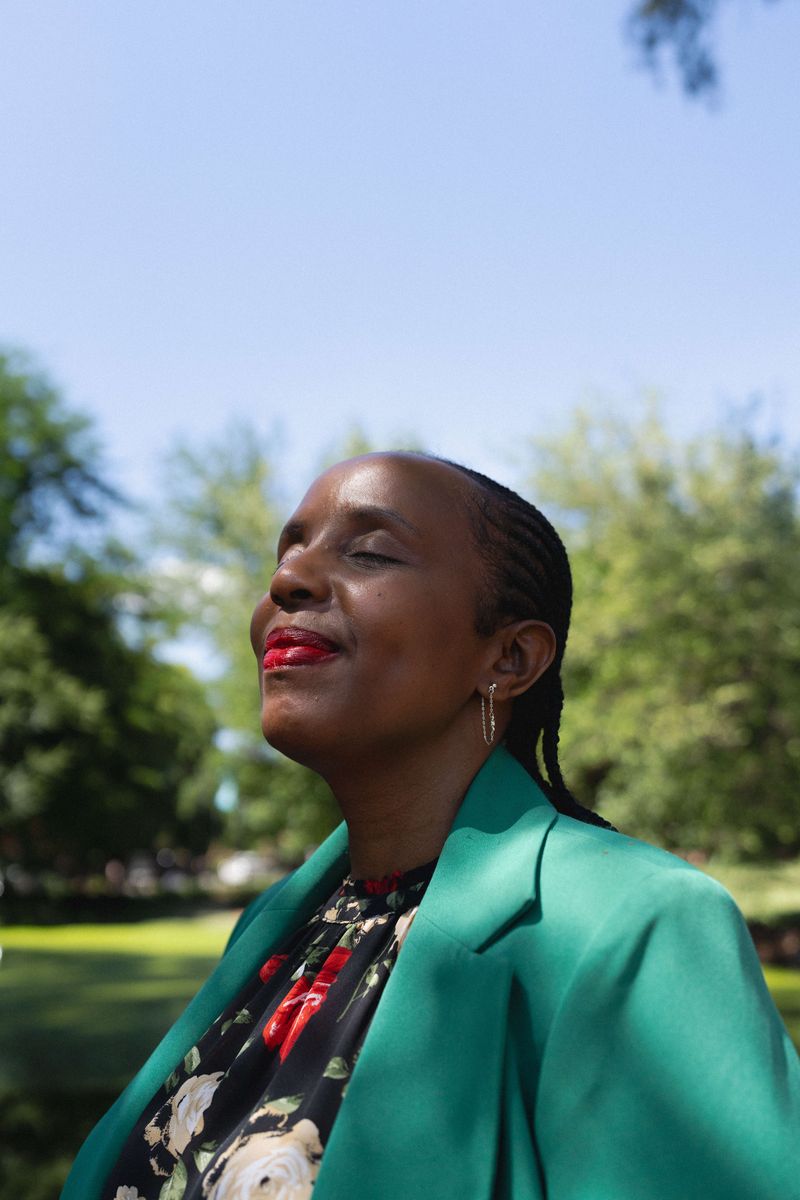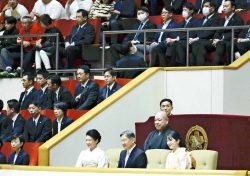
Oncologist Jennifer Rwamugira’s family was targeted in Rwanda.
16:14 JST, December 22, 2024
After he broke out of prison and fled his homeland, Cassien Ntamuhanga began furiously denouncing Rwanda’s autocratic rulers and meeting with exiled opposition figures. A former radio journalist who’d been jailed on conspiracy charges after his broadcasts had run afoul of the government, he bemoaned the suppression of dissent in Rwanda, one of the United States’ closest allies in Africa.
He took on the government from his new home about 3,000 miles away, writing online, giving media interviews – and hoping he was safely out of reach. But his family back home was not.
A month after he escaped Rwanda at age 34 in 2017, his cousin disappeared. The body was found soon after, but police would not release it to the family, three relatives recounted.
Ntamuhanga’s younger brother was detained about two months later. Relatives said he was tortured.
Then police raided his uncle’s home, arresting the man and his son, who were each sentenced to three years in prison on charges of helping a fugitive. A young female relative picked up in the same raid was separated from her infant child and held for six months. None of them had been politically active. But Ntamuhanga’s family remained under pressure, facing repeated police raids, until he vanished entirely three years ago.
Their plight was by no means exceptional, according to interviews with nearly four dozen Rwandans in 12 countries, including many whose relatives have experienced a similar fate and others who have cut ties with their families to protect them. Under longtime president Paul Kagame, who was reelected this summer with 99 percent of the vote, the Rwandan government has often sought to silence critics in exile by targeting their relatives back home, say former Rwandan officials in exile, other Rwandans living abroad and human rights activists. They say family members have been subjected to arbitrary arrest and torture, lost jobs, seen their businesses seized and been denied passports.
In years past, Kagame won international praise for stopping the 1994 genocide that killed about 800,000 Rwandans, or perhaps more, nearly all from the Tutsi ethnic group. Since then, the country has been celebrated as a model of resilience and development in Africa, with brisk economic growth and sharp increases in life expectancy, maternal survival and school attendance. In the capital, Kigali, fleets of electric motorbikes glide past sleek hotels; in the green hills, drones deliver blood and medicine to far-flung clinics. Rwanda has also won praise in Washington and elsewhere for deploying peacekeepers on several fronts in Africa and helping to battle Islamist extremists.
But Kagame and the country have also been criticized for their role in destabilizing the neighboring Democratic Republic of Congo – where, U.N. investigators say, Rwanda is backing a murderous rebel group – and for the suppression of many political opponents, who have been killed, arrested or abruptly disappeared. The Kagame government’s abuses at home have been widely documented by human rights groups, but little attention has been paid to the targeting of relatives of critics abroad.
Rwandan government spokeswoman Yolande Makolo said in an interview that questions about whether Rwanda targeted the families of dissidents were insulting.
“Our country … is 30 years out of apocalypse, out of genocide,” she said. “We lost more than 1 million people and had to rebuild from less than scratch. We have made such progress in the last three decades, including on the most fundamental right, which is the right to life.”
Over the years, a stream of high-level officials in Kagame’s government have broken ranks and fled into exile. One of them, Kayumba Nyamwasa, a former chief of staff for Rwanda’s military who has been accused of links to armed groups, confirmed that relatives in Rwanda were often targeted to stifle critics abroad. “If your relatives are in Rwanda, they are very vulnerable,” he said, adding that these threats have been largely successful.
“If you know harm can befall your relatives, you learn to keep quiet. I know that from personal experience,” said another former senior Rwandan official now living abroad, whose close relative back in Rwanda was targeted and who spoke on the condition of anonymity to avoid retaliation. “There are many people opposed to the regime living abroad, but they prefer to keep quiet.”
By threatening and rounding up family members, Rwandan authorities can retaliate against critics and deter prospective dissidents from raising their voices. But perhaps more than anything, these practices can curb the activism of Rwandans who have fled, even as far afield as the United States and Australia.
“Rwanda’s targeting of people’s relatives is as pervasive as it is effective, and a key strategy to silence dissent and project a positive image of the country abroad,” said Clémentine de Montjoye, a senior researcher at Human Rights Watch. “It means that even in countries where freedom of expression is generally upheld, Rwandans cannot enjoy this right.”
This form of transnational repression is not limited to Rwanda. Thirty-three countries have used “coercion by proxy” to target the family members of prominent activists and journalists in exile since 2014, according to Freedom House, a D.C.-based human rights monitor. Engaging in this practice are such varied countries as China, Russia, Iran, Egypt and Nicaragua, according to Grady Vaughn, a researcher at Freedom House. A spokesman for the Chinese Embassy in Washington denied that China engaged in transnational repression. The embassies of Russia, Iran, Egypt and Nicaragua did not respond to requests for comment.
Rwandans who have seen their relatives targeted include a student leader who left for Australia, where he says he was warned not to engage with Rwanda’s political opposition. After he criticized Rwanda’s repression of exiles, his two brothers back home were arrested and tortured, a close relative said. Many of the Rwandans interviewed for this article spoke on the condition of anonymity out of fear for their security and that of family members.
They also include an outspoken oncologist in South Africa, who said she fled her homeland after refusing to spy on her brother-in-law, an activist lawyer, and poison him. Her husband later disappeared, calling long afterward and then vanishing permanently.
And a former judge who fled Rwanda has continued to complain about the government’s wrongful imprisonment of innocent people even after his wife was briefly detained and several associates jailed back home. “We live in fear, but we still try to raise our hands. Otherwise, we will just die in fear,” said Innocent Niringiyimana, who sought refuge in South Africa, where he said South African intelligence officials warned him he was the target of Rwandan agents.
“Kagame has managed to silence all political debate inside his own country, but that’s not enough for him. He wants to choke off critical discussion all around the world,” said British author Michela Wrong, who chronicled Rwandan repression in her book “Do Not Disturb: The Story of a Political Murder and an African Regime Gone Bad.”
“Targeting the families of those who have fled abroad is one way of doing this,” she said. “If the exiles speak out, they know their loved ones will pay the price.”
A sensitive subject
Ntamuhanga, a tall, slender man with a wide toothy smile and carefully pressed suits, first ran into trouble after taking a job about 10 years ago in Kigali managing a Christian radio station. He had begun holding on-air discussions with two friends about the sensitive subject of reconciliation between the country’s Tutsis and Hutus.
During the 1994 genocide, extremist militias from the majority Hutu ethnic group slaughtered hundreds of thousands of civilians from the minority Tutsi group. Moderate Hutus who tried to protect Tutsis were also killed – and there were killings of Hutu civilians by members of the Rwandan Patriotic Army, led by Kagame, as it liberated territory from the Hutu militias and then pursued them into Congo.
The three friends, all Tutsi, felt that the Hutu victims had been ignored and publicly urged – on the radio, in articles and even in song – that all those who perished should be honored. That viewpoint, however, collided with the government’s narrative that only Tutsis were systematically murdered and that any killings of Hutus were individual acts of revenge. Challenging the government line has long been criminalized as genocide denial.
The friends were arrested within days of one another and accused of being in touch with armed groups. One of them was never seen again. A second was found dead years later, hanged in his cell. Ntamuhanga appeared in police custody a week after his arrest, saying he had been tortured.
During a trial heavily criticized by human rights groups, Ntamuhanga pleaded not guilty to charges that included forming a criminal gang, conspiracy against the government, complicity in a terrorist act and conspiracy to murder. He was sentenced to 25 years in prison.
In 2017, Ntamuhanga escaped from prison and made his way to Mozambique, where he began his public denunciation of the Rwandan government.
“The government shuts you down and makes you withdraw from your family and friends – kills, kidnaps, imprisons, tortures!” he wrote on one occasion. “Opposing this government is more than my right; it is my basic responsibility. … Those who are just listening should stand up and help us get rid of evil in the country, whoever you are and wherever you are from, even if you are from Kagame’s home!”
Living in great fear
Soon after Ntamuhanga surfaced in Mozambique, his family began to suffer. The cousin. The brother. The uncle. Another cousin. The young mother.
The last of them was held for six months on treason and narcotics charges that were eventually dropped, according to three family members and a legal document. Neighbors cared for her young children while her husband and other relatives went into hiding, the young mother said.
Her husband recounted in an interview that he didn’t dare call the neighbors to check on his children lest the neighbor also be arrested. After his wife was released, he said, the two did not speak on the phone for more than a month, afraid that Rwandan authorities had tapped the line. (Rwanda is a leading consumer of Pegasus and similar spyware and other forms of electronic surveillance.) The couple, too, eventually fled Rwanda.
“I was afraid in Rwanda and I am afraid here,” the young mother said quietly in a recent interview held in an African country that is not being identified by The Post for her safety. As she spoke, she sat in the gloom of a ramshackle house, behind a curtain drawn to prevent anyone from looking inside.
In exile with the young mother is another of Ntamuhanga’s relatives, an elderly woman who uses crutches. Family members produced X-rays of her hip showing metal pins that she said were inserted after she was knocked down during what she and two other relatives said was one of several Rwandan police raids on their home after Ntamuhanga went abroad.
In an article written in exile and published online, Ntamuhanga listed family members, friends and even associates who suffered because of his activities, adding that there were others he would not name. “There are those I am not talking about to keep them safe, who live abroad and in the country. Relatives and friends and other acquaintances … inside [Rwanda], living in great fear,” he wrote.
Makolo, the government spokeswoman, declined to answer questions about individual cases, saying, “I don’t have details for everything a political dissident has said, and I don’t see why we have to answer to every accusation from everyone … who is discontent with this government. I resent this kind of questioning.”
Three years ago, Ntamuhanga vanished. Human Rights Watch has said that four sources reported he was detained by Mozambican police and that someone who appeared to speak his native language was present at the time. Mozambican police told rights groups they have no record of his arrest. His friends and relatives say they believe he was killed.
Later that year, a prominent refugee leader close to Ntamuhanga was shot dead. The next year another Rwandan refugee in Mozambique was killed. Mozambican police did not respond to requests for comment.
American ties
In recent years, the United States has been ramping up security cooperation with Rwanda amid concerns that Islamic State affiliates have been expanding their reach in Africa, in particular in Mozambique, Somalia and Congo. With Washington reluctant to deploy troops to African hot spots, U.S. officials have been looking to Rwanda’s military – considered one of the most professional and capable on the continent – to help address the mounting threat.
At the same time, the United States is a top aid donor to Rwanda, supporting its health sector and its push for green energy. Trade between the two countries is also on the rise.
But relations were briefly strained in 2021 by Rwanda’s abduction and imprisonment of rights activist Paul Rusesabagina, who had inspired the movie “Hotel Rwanda,” about saving people amid the genocide, and had received the U.S. Presidential Medal of Freedom. He had been living abroad when kidnapped and was charged with founding and supporting an opposition group that had killed civilians. Rusesabagina, who had a U.S. green card, was released last year after American pressure.
The U.S. government has taken note of other rights abuses by Rwandan authorities. The State Department’s annual report on human rights cited extrajudicial killings, arbitrary arrests, detention of political opponents, life-threatening prison conditions and severe restrictions on media and rights groups, among other serious infractions.
The report also highlighted atrocities by Rwandan-backed M23 rebels in eastern Congo. Rwanda denies backing the rebels despite repeated documentation by the United Nations.
The disappeared
Often, Rwandans initially run afoul of their country’s leaders by ignoring their orders.
Noël Zihabamwe, who had been a student leader, said he left Rwanda to avoid repeated efforts by the ruling party to recruit him. He moved to Australia, where he became the leader of a Rwandan community group. There, his group hosted speakers from both the Rwandan government and the political opposition. But Rwanda’s top envoy to Australia, the high commissioner, told him not to invite any more opposition members, Zihabamwe recalled.
He refused. Relatives say the family soon began to face harassment.
Then in 2019, Zihabamwe spoke to an Australian television journalist about Rwandan repression of exiles, and a month later, his two brothers in Rwanda and a teenage nephew were detained. A close relative said they were tortured. When the nephew was released, “he had marks on his body,” said the relative, fiddling with a silver heart-shaped necklace. “He was too afraid to leave the house. He was afraid of black cars, afraid of everyone because those who detained him weren’t in uniform. He would panic when it got dark. He couldn’t stop crying and shouting.”
The two brothers were also eventually released. But shortly afterward, police pulled them off a bus, relatives said, citing a witness and a message the men sent just before their phones went dead. They have not been seen since.
In the case of the oncologist, named Jennifer Rwamugira, she said she first crossed Rwandan authorities after they demanded that she spy on her brother-in-law and then kill him. Rwandan security agents at the time warned her, “Remember you have a family,” she recounted. “They told me if I don’t comply, my family will face the consequences.”
She resisted their orders and flew to South Africa, where she had been studying oncology and now decided to remain. The agents continued to demand her help over many months, and she continued to balk. Instead, she became more deeply involved in politics, rising to become the chairperson of the Rwanda National Congress, an opposition group whose members include several former top-level government and security officials.
After two years, her husband disappeared. Then, four years after that, her daughter got a call. It was him. He told Rwamugira that he’d been in prison and had been warned not to call. They began talking over a secure app every day.
A month later, she said, he vanished again. She has not heard from him since.
During a recent interview in South Africa, Rwamugira recounted how she had been threatened by the Rwandan security agents. “They said, ‘You will pay a price,’” she said sadly, flipping through old wedding photos on her phone. “I have paid that price.”
Top Articles in News Services
-

Prudential Life Expected to Face Inspection over Fraud
-

South Korea Prosecutor Seeks Death Penalty for Ex-President Yoon over Martial Law (Update)
-

Trump Names Former Federal Reserve Governor Warsh as the Next Fed Chair, Replacing Powell
-

Suzuki Overtakes Nissan as Japan’s Third‑Largest Automaker in 2025
-

Japan’s Nikkei Stock Average Alls from Record as Tech Shares Retreat; Topix Rises (UPDATE 1)
JN ACCESS RANKING
-

Univ. in Japan, Tokyo-Based Startup to Develop Satellite for Disaster Prevention Measures, Bears
-

JAL, ANA Cancel Flights During 3-day Holiday Weekend due to Blizzard
-

Japan Institute to Use Domestic Commercial Optical Lattice Clock to Set Japan Standard Time
-

China Eyes Rare Earth Foothold in Malaysia to Maintain Dominance, Counter Japan, U.S.
-

Japan, Qatar Ministers Agree on Need for Stable Energy Supplies; Motegi, Qatari Prime Minister Al-Thani Affirm Commitment to Cooperation



























